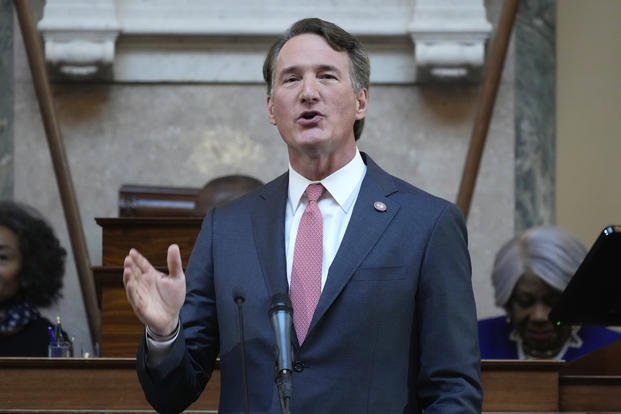
The Virginia National Guard and the Virginia Defense Force will get an ombudsman to assist service members who’ve complained of sexual assault, sexual harassment or retaliation, Gov. Glenn Youngkin ordered Friday.
The executive order comes after he vetoed legislation this year that would have created a Sexual Offense Prevention and Response Officer within the state’s Department of Military Affairs.
The officer was to serve as an advocate for victims, including authority to issue a protective order on behalf of a victim.
“The Governor made clear in his veto statement that he would be addressing this by executive order,” said press secretary Peter A. Finocchio, asked if any particular incident or trend had prompted the order.
Finocchio said Youngkin’s view was that the legislation, which initially passed the House of Delegates on a 93-3 vote and the state Senate by 39-0 “had serious implementation issues” adding that he had flagged these issues during the General Assembly session.
Read Next: Military Domestic Violence Convictions Skyrocketed After Commanders Were Removed from Process
In his veto message, Youngkin said the legislation duplicated the U.S. Department of Defense’s Sexual Assault Prevention and Response, which already applies to National Guard units, and that launching a separate state program could introduce legal and operating conflicts.
He said he was also concerned about fairness for individuals accused of offenses.
“The same officer assigned to advocate for the victim is also responsible for deciding whether to issue the protective order. This dual role undermines the due process rights of the accused, who — like the victim — is entitled to a fair and impartial process. Just as victims deserve an advocate, the accused deserves a neutral decision-maker,” Youngkin’s veto statement said.
Before vetoing the bill, Youngkin proposed a substitute that would eliminate the response officer position, but the House rejected this by a bipartisan 35-61 vote.
Sexual offenses in the military, and concern that service members face retaliation when they complain, have been a concern for years and in 2010 prompted Congress to require the Department of Defense to develop a comprehensive policy to address the issue.
Last year, the department reported a total of 8,195 complaints of sexual assaults.
Military commanders and special trial counsel found they had sufficient authority to consider 3,233 cases for possible action against the accused, and found evidence supported taking disciplinary action in 2,128 cases. They found a total of 26 complaints to be baseless or false.
Read Next: Female Troops Played Key Roles in B-2, Submarine Strikes on Iran’s Nuclear Facilities
© 2025 Richmond Times-Dispatch, Va.. Visit www.timesdispatch.com. Distributed by Tribune Content Agency, LLC.
© Copyright 2025 Richmond Times-Dispatch, Va.. All rights reserved. This material may not be published, broadcast, rewritten or redistributed.




